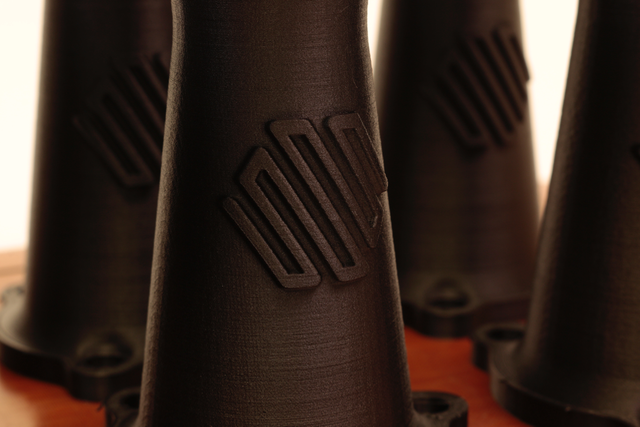
Introducing Our New Markforged Material: Onyx
Onyx is our newest matrix material for Markforged composite 3D printers. It’s not a new fiber by any means, but it's a carbon fiber filled thermoplastic that you can use as when you need to 3D print strong, stiff parts. Here are just some of the reasons why this material is particularly exciting.
What is Onyx?
First, lets start with some etymology. The name Onyx comes from a mineral with the same name. Onyx the mineral is known for its surface finish, strength, and hardness. While Onyx the filament contains none of the mineral, its name reflects the properties that makes the mineral so valuable.

Onyx is a fusion of engineering nylon and chopped carbon fibers. Along with a high-quality surface finish, the chopped fibers within the Onyx material adds stiffness to your 3D printed parts, providing micro-carbon reinforcement to make parts stiff, strong, and true to their dimensions.
Read our Composites Design Guide
Material Properties
Onyx is about twice as strong as ABS because of the micro-carbon reinforcement. Because Onyx contains nylon, the engineering toughness and wear resistance is comparable as well, and the material has a heat deflection temperature of 145C. You can use it with our high-strength fibers – carbon fiber, Kevlar®, fiberglass, or HSHT fiberglass, to even further strengthen your parts. With Onyx and composite fibers, the strength of your 3D printed parts can reach staggering levels, which is awesome. Check out the data sheet here!

Dimensional Stability
Apart from the material properties that we list on our data sheet, another neat thing about Onyx is its dimensional stability. What does this mean? It means your parts will be more accurate to your CAD model. This means minimized warping, larger overhangs, and sharper edges. The micro-carbon reinforcement changes the way the material behaves once it comes out of the extruder and cools – there is less thermal deformation and faster heat dissipation within the material, so parts warp less on the build plate and can tolerate steeper overhang angles. As a result, the part comes out of the printer just how you designed it.
Request a free sample part
The Surface Finish

Many Markforged users use their printers to make customer-facing parts. With our standard nylon, this can sometimes be an issue. The parts are strong and tough, but layers of fiber ingrained in semi-translucent nylon isn’t always the nicest thing to look at if you’re producing end-use parts. The 100-micron-layer resolution that our printers provide combined with the Onyx matte black finish provides a smooth, good-looking surface finish with layer seams that are near invisible.
No Post-Processing Necessary!
With the dimensional stability and the impeccable surface finish, you will rarely need to post-process your parts. Unlike other 3D printed parts, Onyx needs no dyeing to hide internal honeycombs, no chemical baths or sanding to get rid of those annoying 3D printed ridges, and no filler putties or materials to fill in gaps from warping. Onyx is ready to go, right off the print bed.

Applications
So what can you use Onyx for? The short answer is – anything, it’s 3D printing filament! But really, what makes Onyx special is that its surface finish and the strength it and the continuous fibers provide allow you to make end-use parts that work well and look really good. This new Markforged filament can create parts that are usable and visible, transforming your high-strength, industrial 3D printed parts from prototypes to final products.

Hope you have fun with it!
Try out the material
All of the blogs and the information contained within those blogs are copyright by Markforged, Inc. and may not be copied, modified, or adopted in any way without our written permission. Our blogs may contain our service marks or trademarks, as well as of those our affiliates. Your use of our blogs does not constitute any right or license for you to use our service marks or trademarks without our prior permission. Markforged Information provided in our blogs should not be considered professional advice. We are under no obligation to update or revise blogs based on new information, subsequent events, or otherwise.
Never miss an article
Subscribe to get new Markforged content in your inbox